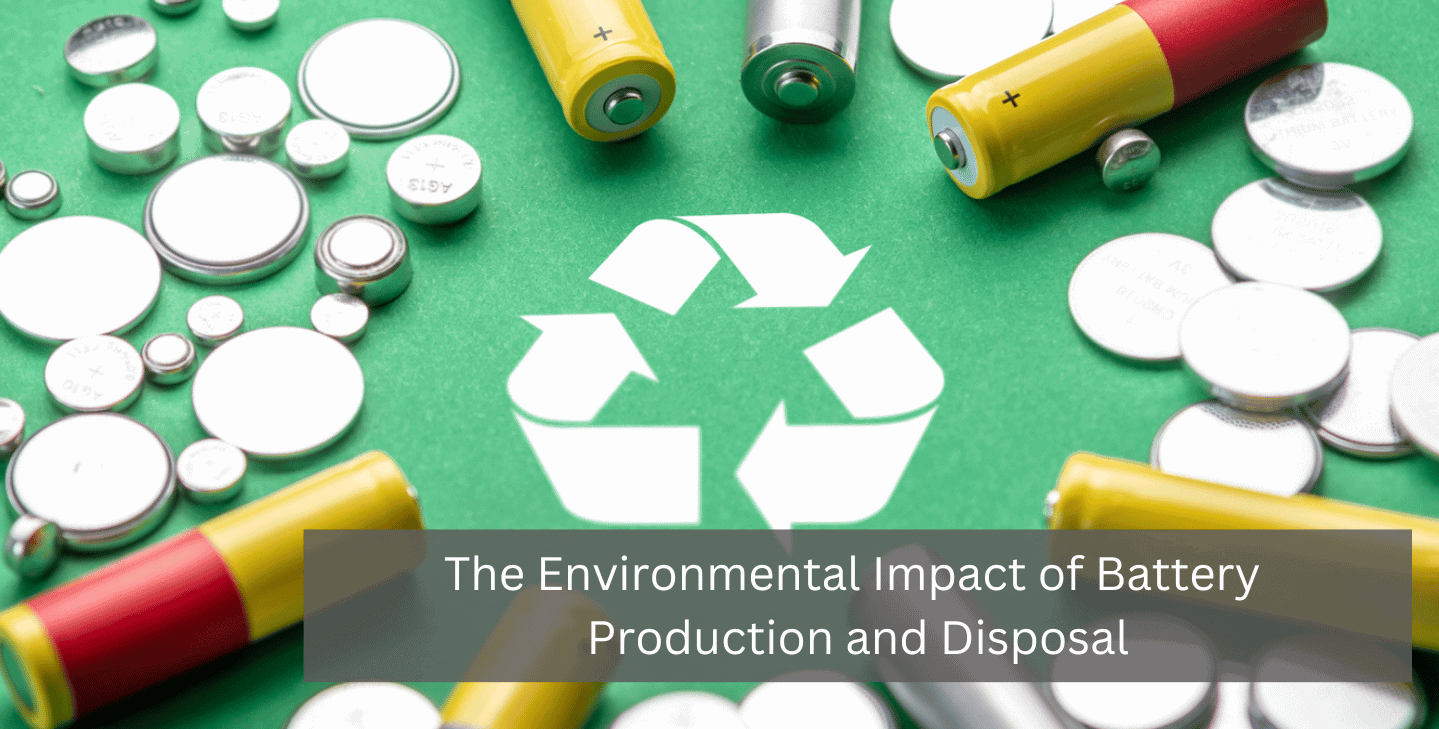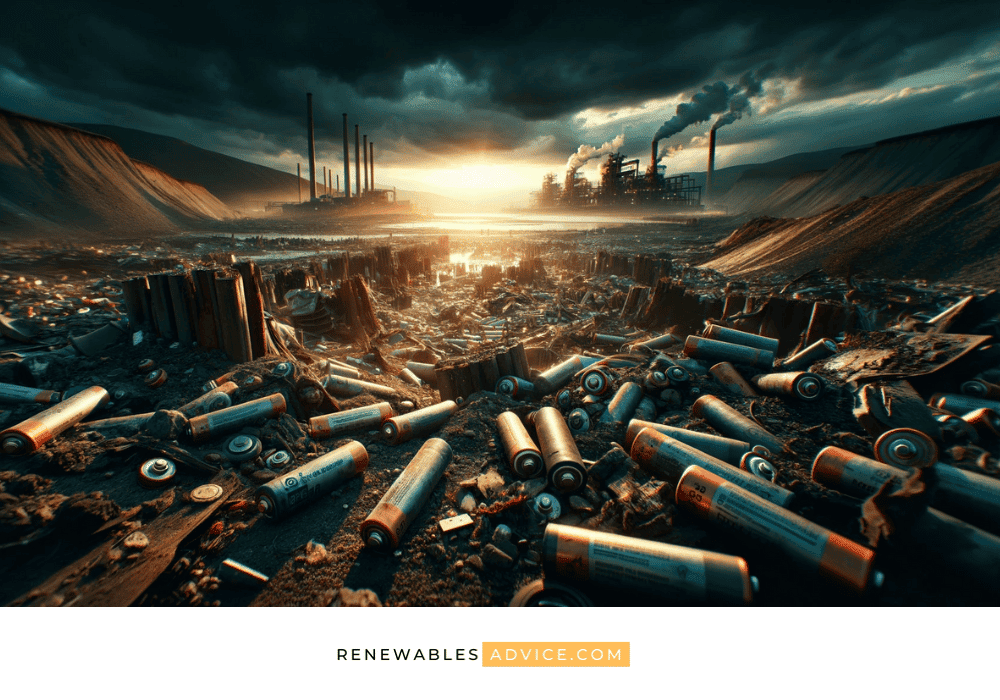The Environmental Impact of Battery Production and Disposal
The Environmental Impact of Battery Production and Disposal
The Environmental Impact of Battery Production and Disposal

In today’s world, batteries are everywhere. They power our phones, laptops, and increasingly, our cars. Yet, there's a hidden cost to this convenience that often goes unnoticed. We're talking about the environmental impact of battery production and disposal. It's a topic that's not just important, but urgent. We need to pay attention, and here’s why.
The process of making new batteries, particularly lithium-ion ones, is resource-intensive. It involves mining for metals like lithium, cobalt, and nickel - activities that leave a significant ecological footprint. These processes contribute to habitat destruction, water pollution, and greenhouse gas emissions. Then there's the disposal aspect. Most used batteries end up in landfills, leaching toxic chemicals into the soil and water. Sure, recycling programs exist, but they're not nearly as widespread or efficient as they should be. This situation presents more than just challenges; it's an escalating environmental cost.
The Process of Battery Production and Its Environmental Effects
Batteries are a crucial part of our sustainable future but each battery type has some impact on the environment during its production, manufacturing process, and disposal.
Lithium-Ion Batteries: The Tech Game Changer
Let's face it, lithium-ion batteries are everywhere. They're the juice behind everything from your smartphone to electric cars. These batteries start their life in a pretty complex way. It all begins with digging up raw materials like lithium and ends with piecing the battery together. They're key players in moving us towards greener energy, but it's not all smooth sailing.
Mining Lithium: Not So Simple
Sure, lithium-ion batteries are a step towards cleaner energy. But, let's not kid ourselves about the cost to the environment. Mining lithium, crucial for these batteries, often happens in salt flats and sensitive ecosystems that really can't take the hit. When lithium is mined, it messes with local water and wildlife, and it's a power hog. It adds a hefty chunk to the battery's carbon footprint.
Lead-Acid Batteries: Old School, But Tricky
Lead-acid batteries are the old guards of the battery world. You'll find them in cars and emergency power setups. They're simpler to make than some of the new tech, but here's the catch: they're pretty rough on the environment. Lead is toxic, and making these batteries isn’t exactly clean. Recycling them right is key to cutting down the harm.
Nickel-Cadmium (NiCd) Batteries: Tough but Troublesome
NiCd batteries are the tough cookies in extreme conditions. They're reliable and can take a beating in hot or cold. But, and it's a big but, cadmium is nasty stuff. It’s a heavy metal that can do a number on the environment and our health if it's not disposed of in the right way.
Nickel-Metal Hydride (NiMH) Batteries: The Lesser Evil
In the world of hybrid cars, NiMH batteries are a big deal. They're a step up from NiCd batteries, being less toxic and friendlier to the planet. However, they've got their own baggage. The rare earth metals in these batteries can leave a pretty hefty environmental footprint, not unlike their lithium-ion cousins.
The Carbon Issue: More than Meets the Eye
Making these batteries is a power-hungry affair. It's not just about the energy used; it's also about the carbon dioxide they pump out. From the fossil fuels burned to get those raw materials to putting the battery together, every step piles on more to the carbon footprint. So, the idea that these batteries are completely green? Well, it's a bit more complicated than that.
Rethinking Battery Making
The demand for batteries is skyrocketing, and we've got to get smarter about making them. This means packing more power into less material, ditching harmful mining practices, and leaning away from fossil fuels in the production process. The aim? To dial down the environmental toll while keeping the perks of lithium-ion tech.
Environmental Concerns Specific to Lithium Batteries
It's no secret that the EV (electric vehicle) world is booming, and with it, the demand for lithium-ion batteries is skyrocketing. But, there's a catch – this surge isn't exactly gentle on our planet. Take lithium extraction, for instance. It's a thirsty process, guzzling water and messing with soil. Back in 2016, protesters in Tibet were so fed up with a local lithium mine polluting their ecosystem that they took to the streets, dead fish in hand, in protest. And in China's Yichun city, they had to put the brakes on lithium production due to water pollution concerns.
Then there's the whole process of battery manufacturing. It's a double-edged sword – needing heaps of energy and dealing with some not-so-friendly chemicals. This means manufacturers are in a tight spot, trying to ramp up production without trashing the environment.
But wait, there's more. Even after these batteries have done their bit in powering our devices, they're not off the hook. Recycling them is a growing trend, sure, but it's still finding its feet. Plus, recycling lithium batteries isn't exactly a walk in the park; it needs its share of energy and resources, and the efficiency of recovering materials like cobalt and lithium is still evolving.
And let's not forget the big picture – the broader environmental and social impact of the entire battery supply chain. From digging up the raw materials to the final disposal, the process is fraught with environmental and social pitfalls. Especially alarming is the impact of cobalt and nickel mining, essential for some lithium batteries. A grim example is in Cuba, where mining has turned over 570 hectares of land lifeless and polluted miles of coastline.
So, while lithium-ion batteries are key players in our shift towards electric vehicles, they bring their own set of environmental headaches. The challenge? To keep pushing the boundaries of battery tech and recycling methods, making sure our drive towards electric mobility is as environmentally friendly as it can be.
The Role of Batteries in Electric Vehicles
Electric Vehicles (EVs) hinge on battery tech, mainly lithium-ion, to keep rolling. These batteries pack a punch in terms of energy and lifespan, but they're not without environmental baggage. When you stack up the production of electric vehicle batteries against old-school internal combustion engines, the eco-cost is higher for EVs. This is mostly down to the heavy-duty mining and processing of lithium, cobalt, and nickel. Plus, nearly half of an EV's carbon emissions are chalked up before it even hits the road.
EVs are a beacon of hope for reducing air pollution, but there's a twist. The growing environmental toll of their batteries, especially the lithium mining and making process, is hefty. Recycling? We're not quite there yet. Though, hats off to companies like Nissan and Volkswagen for stepping up with their current recycling initiatives. For EVs to truly be the environmental heroes we want them to be, we need a gear shift. This means embracing low-carbon methods like hydrogen and biofuels in lithium processing, ramping up renewable energy use, and getting better at recycling batteries. It's a complex battle on multiple fronts, but one we need to win to make EVs a real force for a greener future.
The Human Cost of Battery Production
Lithium-ion batteries power our tech-driven world, but they come with a heavy human toll, especially in the Democratic Republic of Congo's cobalt mines. Here, miners, including children, face exploitation and unsafe working conditions. Children are working without even basic safety gear leading to health problems like constant coughing, serious lung issues and urinary tract infections. Shockingly, there's evidence from research by the universities of Lubumbashi, Leuven and Ghent, that the toxic environment is causing birth defects in miners' children.
The environmental impact is just as grim. As we chase efficient batteries, the planet pays a price. Responding to this, the EU has stepped up by making companies recycle or repurpose old batteries, pushing for more recycled lithium in new ones. This move signals a shift towards more planet-friendly battery practices in production and disposal.

Understanding the Impact of Battery Disposal and Recycling
Battery disposal and recycling can be broken down into:
The Environmental Toll of Discarding Batteries
The rise in the use of electric vehicles brings a worrying trend in battery disposal. These EV batteries, when not properly discarded, pose a serious threat to our environment, leaking harmful chemicals into the earth and water.
The Complex World of Recycling Batteries
Recycling lithium-ion batteries isn't straightforward. The variety of materials like lithium cobalt oxide and lithium-iron phosphate make processing and sorting tough. Plus, electric car batteries complicate things further with their size and structure due to containing thousands of cells grouped in modules, circuitry, safety devices, and sensors.
Environmental Challenges in Battery Production and Use
Every stage of a battery's life, from mining lithium to its final disposal, leaves an environmental mark. This entire process needs urgent rethinking to minimise harm.
Shifting to Greener Batteries
Innovations in battery design aimed at easier recycling, the development of more efficient recycling processes, and the exploration of alternative, less harmful battery chemistries are crucial.
Recycling Methods: A Closer Look
Currently, lithium-ion battery recycling methods are focused on pyrometallurgy (smelting) and hydrometallurgy (chemical leaching). Smelting and chemical leaching have their own problems. Smelting is energy-hungry and incomplete, while leaching demands harsh chemicals.
New Tech in Battery Recycling
There's hope with new technology like those developed by The ReLiB project at the University of Birmingham. They’re focusing on the automation of battery recycling processes by developing robotic systems for safer, more efficient lithium battery recycling.
Global Policies and Standards for Battery Recycling and Disposal
Let's dive into how countries globally handle battery recycling and what specifically the EU is doing about it. The EU updated its battery directive to ensure that when a battery's life is over, it needs to be reused or recycled, not just tossed away. They're even mandating that batteries carry labels showing their carbon footprint to promote more transparency about their impact on the environment. Plus, they've set solid goals for recycling older batteries with free collections of various battery types.
Now, looking globally, it's a mixed bag. In North America and Europe, almost all lead-acid batteries get recycled – that's a big win. But in India, without strict rules, it's a risky business, leading to unsafe processing methods. China is taking a different route, making battery makers handle the recycling part through their Extended Producer Responsibility (EPR) policy. And the United States? They're working on it by developing guidelines, especially focusing on Li-ion batteries as part of a broader carbon-neutral strategy.
What this all boils down to is that recycling batteries is important for the environment. As more electric cars hit the roads, getting recycling right is key to a sustainable future.
Potential Solutions and Future Directions
Battery tech is on the brink of a revolution. We're steering away from the old, hazardous, energy-intensive ways of doing things, to more sustainable and ethical alternatives. For instance, a technique developed by Princeton's researcher's new lithium extraction method involving porous fibers is a game-changer. It uses less land and time for lithium production, crucial for electric cars and energy storage.
Also, there's a buzz about next-gen battery technologies including high-nickel, silicon anode-based, and solid-state batteries. These aren't just upgrades; they're complete overhauls offering better safety and efficiency. And it's not just about the tech. It's a big piece of the puzzle for a greener economy, especially in slashing the transportation sector’s carbon emissions.
A future where our tech respects the planet and the people on it isn’t too far away with the current innovations in battery technology. Aligning with sustainability and ethical principles, industry progression in this field is pointing in the right direction.